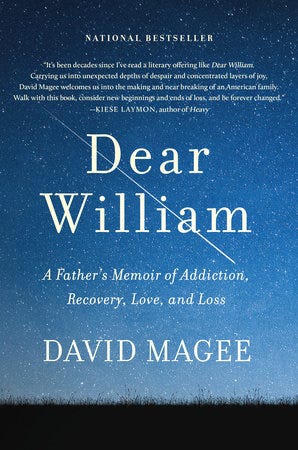Want to write a memoir?
Memoir writing is not for the faint-hearted, but can help others through relatability: here's what you need to know to get started
Well, today is the day—my memoir A Little Crazy is published! It’s my second memoir in the past three years (Dear William was first in late 2021), and believe it or not, I have one more to come.
Now, I get to sweat and anguish over how it's received and hope and pray it helps somebody else, which will make it all worthwhile.
So, today, we'll celebrate me and my new crazy-ass book (which is all true, but a little nutty, like life; read it and see for yourself), as well as celebrating the gift of writing because personal writing is healing, for many of us. For more on that, here’s the latest episode of my A Little Crazy podcast, just out today(!) which discusses memoir writing, and how I wrote this book and why. Hope you’ll give it a listen.
The Keys to Writing Vulnerable Memoir
So, you want to write a revealing book about your life?
That's fantastic: writing a memoir can be therapeutic, leading to profound self-discovery and personal growth. This process can be incredibly inspiring and motivating for you as the writer — though it does come with relational risk.
Thus, if you want your story published for public reading—understand that writing about yourself requires unusual vulnerability if you want readers to relate to you and not toss you aside as an unreliable narrator. That means you must be willing to expose yourself publicly, sharing what we are taught to hide. Not so much hard knock, embarrassing facts, but difficult feelings.
Then there are all the others in your life—family and close relationships. Writing about them is extremely difficult.
What's required?
I tell aspiring memoir writers it takes two things to tell an honest story involving family and others:
1) Dead people.
2) People willing to put a cause or reason for the storytelling above how they may look in it.
For instance, my family has allowed me to write revealingly about what we faced with addiction and loss trauma because they have seen how writing helps others. They see the tangible impact of people from throughout the country who have come forward and said it changed or saved them. Therefore, my family allows me to write about them and tell our story despite the discomfort or embarrassment of what we faced.
That's rare, I'll be honest. I’m a lucky writer in that regard.
For most, achieving number two on the list of requirements is challenging.
As for number one, dead people, that's easy enough: Wait until they are dead. Once a family or loved ones we want to write about in complex subject matter are deceased, it's easy to say whatever is needed as long as the storyline sticks to basic truth. That's why I can write about my complicated relationship with my late adopted father. He's been dead for 15 years.

Once you have overcome these hurdles, remember you can always change characteristics, including names, age, where someone lives if they are still living, and even some of the storyline. You have a right to tell your story, which can't help but involve others, but if you don't have their permission or blessing, it's wise to change some characteristics—name, especially.
Sure, in the 21st century, dots are easily connected. However, with several changed facts, the character becomes someone else on the page, allowing the reader to get the gist while sparing the specificity of the person.
Overall, my advice is to tread carefully. I've had no choice but to write my two memoirs, first with Dear William and now A Little Crazy, because the books are central to my well-being work in finding solutions for students and families in mental health and substance misuse. I'd do it again, but revealing your personal story is not for the faint-hearted. It's emotional, putting your secrets out to the world, and there are likely only two or three books in a year throughout the country that sell to expectations. Odds are high. You'll get let down since almost every author of every book battles those feelings.
Also, books take a while to get through the publishing pipeline — so sometimes it's two years after you've finished the manuscript that it reaches the marketplace. Readers are delving into your life at a time when you have moved to a different place. Thus, it's high-stakes emotional work for a memoirist.
My advice then is that writing a personal story is highly advised, even if that means merely making notes for your benefit to keep, learn from, and reflect upon. If taking the work public is the aim, consider the reason; if helping others is the foundation of why, well, then, come along for the journey while understanding, it’s not for the faint-hearted.
Your writing may stir some emotions, of yourself, of others in your life, but if it can help others, by all means — come join me in this frightening journey.




Thank you, I got a lot out of reading this. deciding to share some of the background experiences you experienced in and around the writing and sharing of your words. I hadn't considered how jarring it may be for an author to be several years in the future of their journey forward, as compared to the assumed time and space their readers would have envisioned. I'm really keen to read your books!